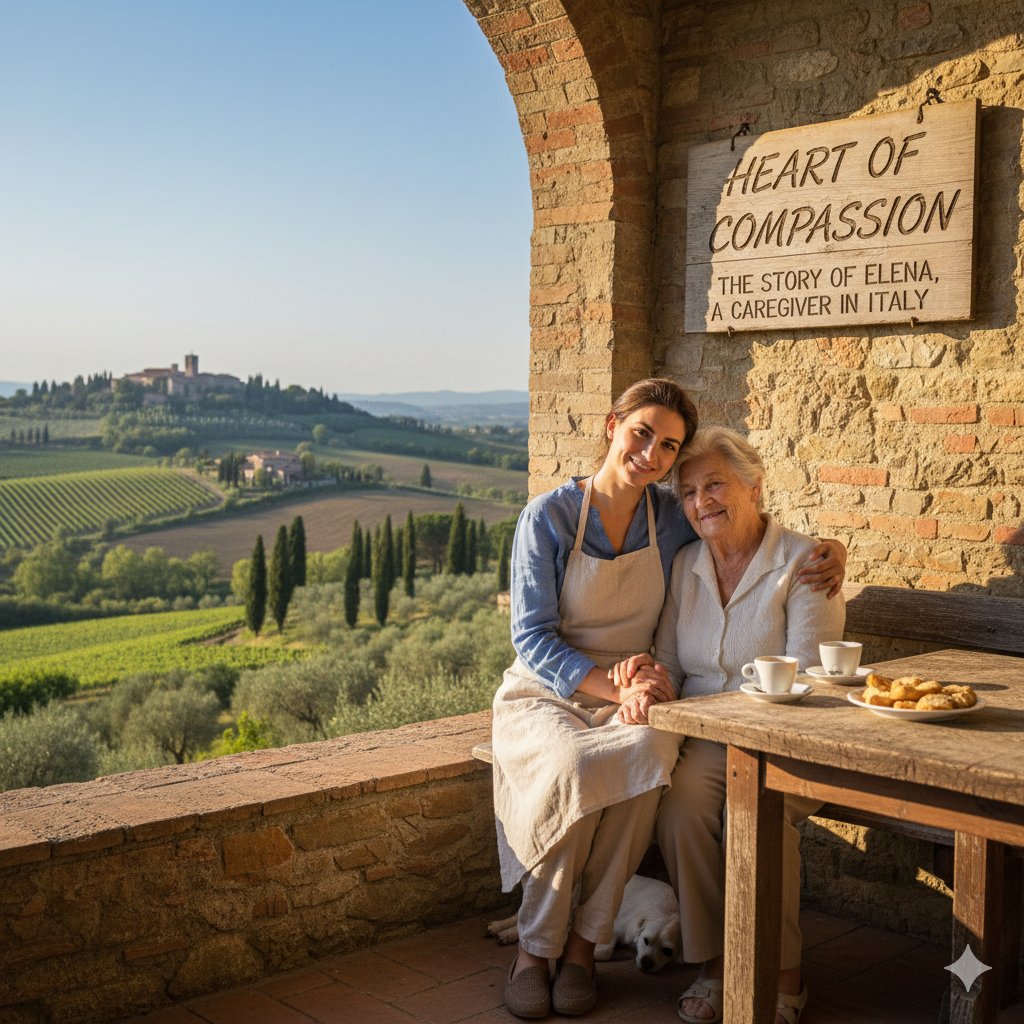The streets of Rome glowed under the morning sun, their golden hues reflecting off centuries old buildings. Amid the hum of early traffic, Elena Villanueva adjusted her scarf and tightened her coat as she walked briskly toward the small apartment of her employer, Signor Romano, an elderly widower she had been caring for over the past four years.
Every day began with the same rhythm prepare breakfast, organize medicines, and assist her patient but for Elena, it was more than a routine. It was a mission of love, born out of sacrifice and the unyielding hope that one day, her family in the Philippines would have a better life because of her work abroad.
Elena was a mother of three from Cavite, Philippines. Her husband, Carlo, worked as a tricycle driver, and though they lived simply, life was always a struggle. When their eldest son got accepted into college, Elena knew her husband’s income would not be enough.
“I’ll go abroad,” she said one evening, her voice steady but her heart trembling, “I can work as a caregiver. It’s honest work, and I’ll earn more.”
Carlo sighed, holding her hand tightly. “We’ll miss you, Len. But if that’s what it takes for the kids’ future. We’ll be strong here.”
That night, Elena hugged her children tighter than ever before. Her youngest, Liza, whispered through tears, “Mama, don’t forget us.” Elena smiled gently. “Never, anak. Everything I do will be for you.”
Elena’s first months in Italy were filled with uncertainty. The language barrier made communication difficult, and the cold winters were a shock compared to the humid air of the Philippines.
She found work through an agency, caring for an elderly man named Signor Romano, who suffered from mild dementia. At first, Romano was distant and irritable, refusing to eat or speak much. But Elena, with her natural warmth and patience, never gave up.
Every morning, she greeted him cheerfully. “Buongiorno, Signore! Let’s eat breakfast, yes?”
Gradually, Romano began to respond. He started telling her stories about his youth, his late wife, and the days when he worked as a musician. Elena listened intently, her soft laughter filling the quiet apartment.
Over time, a bond grew between them not of employer and worker, but of friendship and trust.
Elena’s workdays were long twelve hours of standing, lifting, and assisting. Yet, the hardest part was not the physical exhaustion; it was the loneliness that crept in at night.
Every Sunday, she called her family through video chat. Her children’s faces on the screen gave her life.
“Ma, I passed my exams!” her son Mark said proudly.
“That’s my boy! Keep studying hard,”she replied, smiling despite the tears forming in her eyes.
Carlo always ended the call with the same words: “We’re proud of you, Len. Just a little more patience.”
Those words kept her going. Each day, each hour of work was one step closer to her dream a small house, her children’s education, and a peaceful retirement with her husband by her side.
Despite her kind demeanor, Elena faced many challenges as an OFW. Some of her fellow caregivers shared stories of unpaid wages and unfair treatment. She knew she was fortunate to have a respectful employer, but homesickness was her constant companion.
There were nights she’d cry quietly in her small rented room, holding the rosary her mother had given her. “Lord,” she prayed, “please give me strength. I’m so tired, but I can’t give up now,”
Her prayers seemed answered each time she saw progress her son’s graduation photo, the message that her husband had repaired their leaking roof, or the video of her youngest daughter singing at a school event. Those small victories made every tear worth it.
One afternoon, while preparing tea, Signor Romano asked her, “Elena, why did you come all the way from the Philippines?”
She smiled softly. “For my family, Signore. I want to give them a better life.”
He nodded slowly, his eyes reflecting admiration. “You Filipinos… always working with heart.”
That simple sentence filled Elena with pride. Indeed, wherever Filipinos went as nurses, seafarers, or caregivers they carried the same heart, compassion, and resilience.
As months passed, Romano’s health declined, and his memory began to fade more rapidly. There were days when he couldn’t even recognize Elena. But still, she stayed by his side, feeding him, singing softly when he was restless.
One morning, he looked at her and whispered, “Grazie, Elena. You are my angel.”
It was the last clear thing he said before passing away a few weeks later.
When Romano’s family held the funeral, they invited Elena to sit with them. His son told her, “You cared for my father as if he were your own. We will never forget your kindness.”
Tears streamed down her face, “He treated me like family too.”
Though her heart ached, Elena knew she had fulfilled her duty not just as a worker, but as a human being who loved selflessly.
After her contract ended, Elena decided to renew it, finding work with another elderly woman, Signora Bianca. Her experience with Romano gave her confidence and wisdom. She became known among her peers as “Tita Len,” the caregiver who always had a smile and a word of encouragement.
She also began sending part of her earnings to fund a small community program back home a support group for families of OFWs. She wanted to help others understand the struggles their loved ones faced abroad.
Every Christmas, she decorated her room with parol lanterns from the Philippines. Even far from home, she celebrated her heritage with pride.
After eight long years, Elena finally went home for good. Her children were grown, her husband had built a small repair shop, and their modest home stood proudly in their neighborhood.
Her return was met with laughter, tears, and hugs that lasted forever. Liza, now in college, held her tightly. “Mama, you’re home. No more goodbyes.
Elena smiled, feeling the warmth of home embrace her once again. “No more, anak. I’m here to stay.”
She later opened a small training center for aspiring caregivers, teaching them not only the technical skills but also the values of compassion and respect.
“Being a caregiver,” she often said to her trainees, “isn’t just about tending to someone’s body. It’s about caring for their heart.
Today, Elena’s story stands as a tribute to the millions of Filipinos who leave home to serve others. Her life reminds us that while distance separates families, love and purpose bridge every gap.
She once crossed borders to chase a better future, but in the process, she discovered something greater that kindness, no matter where you are in the world, can change lives.
For Elena, the journey of caregiving was not just a job. It was her calling, her strength, and her way of turning sacrifice into love that transcended all boundaries.



